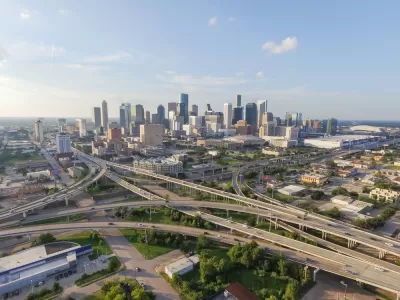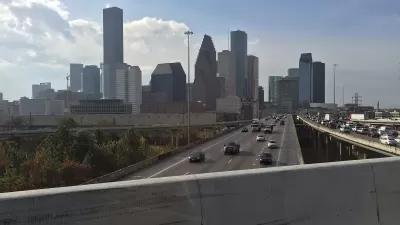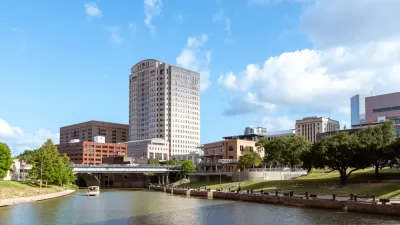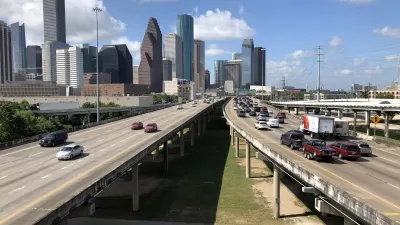Local and state officials have come to an ‘historic’ agreement that could move the stalled project forward.

The controversial expansion of Interstate 45 in Houston could go forward in as soon as two years after officials reached an agreement about the project, reports Dug Begley, who has been following the freeway saga for the Houston Chronicle.
“The agreement outlines plans for widening the freeway by adding two managed lanes in each direction from downtown Houston north to Beltway 8, along with various frontage road and interchange alterations,” Begley writes.
After months of negotiations, the Texas Department of Transportation (TxDOT) agreed to increase the amount of money it will provide to the Houston Housing Authority to fund relocation and affordable housing. “The project also connects to trails for running and biking, adds air monitoring in certain areas, adds features aimed at encouraging transit use and commits to stormwater design changes sought by the Harris County Flood Control District.”
TxDOT must still come to an agreement with the Federal Highway Administration (FHWA), which halted work on the project in March 2021. “The FHWA told TxDOT to halt development of the project as it reviewed concerns raised by Rep. Sheila Jackson Lee and others that the outreach to some minority communities was insufficient and violated civil rights laws by harming some Black and Latino neighborhoods.” According to a TxDOT spokesperson, the agency is “having productive conversations with FHWA.” Critics of the project maintain their opposition, saying that widening the freeway at all will create more traffic and displace residents and businesses.
FULL STORY: I-45 expansion back on as Houston leaders announce compromise for $10B construction project

Study: Maui’s Plan to Convert Vacation Rentals to Long-Term Housing Could Cause Nearly $1 Billion Economic Loss
The plan would reduce visitor accommodation by 25,% resulting in 1,900 jobs lost.

North Texas Transit Leaders Tout Benefits of TOD for Growing Region
At a summit focused on transit-oriented development, policymakers discussed how North Texas’ expanded light rail system can serve as a tool for economic growth.

Why Should We Subsidize Public Transportation?
Many public transit agencies face financial stress due to rising costs, declining fare revenue, and declining subsidies. Transit advocates must provide a strong business case for increasing public transit funding.

How to Make US Trains Faster
Changes to boarding platforms and a switch to electric trains could improve U.S. passenger rail service without the added cost of high-speed rail.

Columbia’s Revitalized ‘Loop’ Is a Hub for Local Entrepreneurs
A focus on small businesses is helping a commercial corridor in Columbia, Missouri thrive.

Invasive Insect Threatens Minnesota’s Ash Forests
The Emerald Ash Borer is a rapidly spreading invasive pest threatening Minnesota’s ash trees, and homeowners are encouraged to plant diverse replacement species, avoid moving ash firewood, and monitor for signs of infestation.
Urban Design for Planners 1: Software Tools
This six-course series explores essential urban design concepts using open source software and equips planners with the tools they need to participate fully in the urban design process.
Planning for Universal Design
Learn the tools for implementing Universal Design in planning regulations.
City of Santa Clarita
Ascent Environmental
Institute for Housing and Urban Development Studies (IHS)
City of Grandview
Harvard GSD Executive Education
Toledo-Lucas County Plan Commissions
Salt Lake City
NYU Wagner Graduate School of Public Service





























